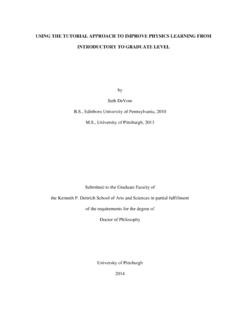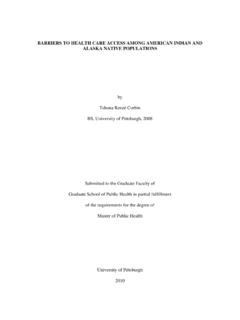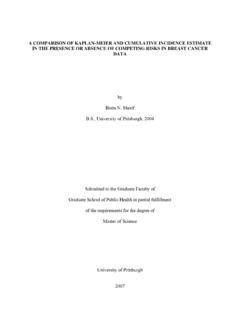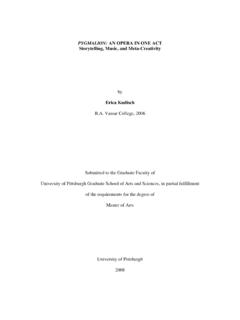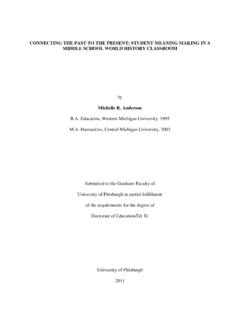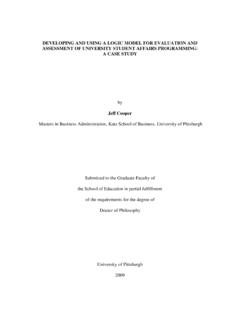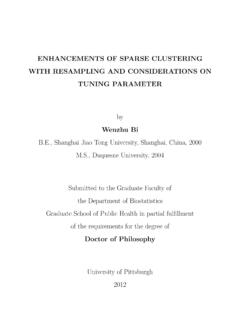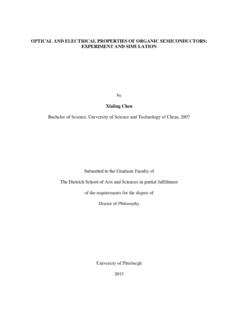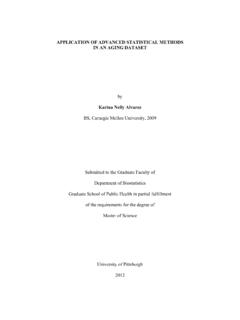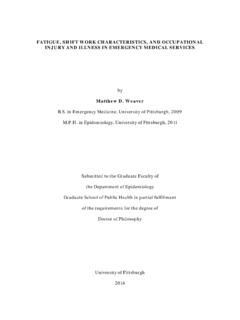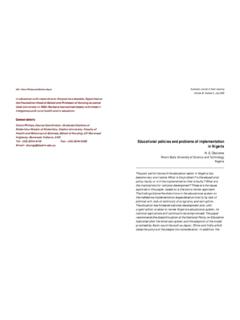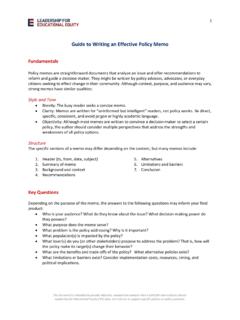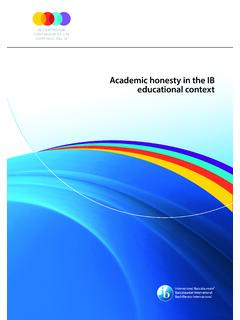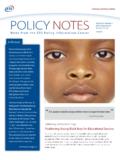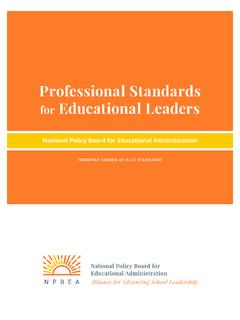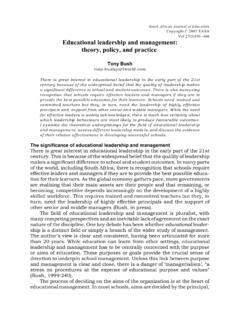Transcription of EDUCATIONAL POLICY IN TANZANIA FROM INDEPENDENCE …
1 1 EDUCATIONAL POLICY IN TANZANIA FROM INDEPENDENCE TO THE PRESENT: CONTINUITY AND TRANSFORMATION by Nina Elizabeth Weaver Bachelor of Philosophy, University of Pittsburgh, 2011 Submitted to the Faculty of Arts & Sciences in partial fulfillment of the requirements for the degree of Bachelor of Philosophy in International and Area Studies University of Pittsburgh 2011 2 UNIVERSITY OF PITTSBURGH Arts & Sciences This thesis was presented by Nina Elizabeth Weaver It was defended on April 1, 2011 and approved by William James Jacob, PhD, Professor, School of Education, University of Pittsburgh Amy Stambach, PhD, Professor, EDUCATIONAL POLICY Studies and Anthropology, University of Wisconsin-Madison John C. Weidman, PhD, Professor, School of Education, University of Pittsburgh Thesis Advisor: Macrina C. Lelei, PhD, Associate Direct, African Studies Program, Adjunct Assistant Professor, School of Education, University of Pittsburgh 3 Copyright by Nina Elizabeth Weaver 2011 4 This thesis studies the changes in the formal EDUCATIONAL policies in TANZANIA from INDEPENDENCE until the present.
2 Since INDEPENDENCE in 1961, the government of TANZANIA has attempted several times to reform the EDUCATIONAL system to meet their development objectives different objectives and generate desired outcomes. This thesis compares the 1967 Education for Self-Reliance POLICY with the most recent 1995 Education and Training POLICY by taking a historical view of the role of work-oriented education in primary and secondary institutions. Using the framework developed by Wim Hoppers (1996), this study finds that work-oriented education is an important strategy for improving the relevance of the EDUCATIONAL system in both policies. However the EDUCATIONAL system has undergone noteworthy changes in the approach and focus of work-oriented education during this time. The most significant of these changes is a shift in emphasis from rural-oriented vocational education to technology education as the major focus of work-oriented education, demonstrated through supplementary education policies such as the 2007 Information and Communication Technology POLICY .
3 This thesis maintains that the continued presence of work-oriented education has important implications for the 1995 Education and Training POLICY , particularly because the current work-oriented program shares many of the same challenges that impeded the 1967 Education for Self-Reliance POLICY . Through historical analysis of past experiences and issues, these challenges must be recognized and addressed in order for the current POLICY to be successfully implemented and to achieve its work-oriented education objectives. EDUCATIONAL POLICY IN TANZANIA FROM INDEPENDENCE TO THE PRESENT: CONTINUITY AND TRANSFORMATION Nina ElizabethWeaver, BPhil University of Pittsburgh, 2011 5 TABLE OF CONTENTS 11 CURRENT STUDY AND METHODS .. 12 Methods .. 14 RELATED ISSUES, CONCEPTS, AND DEFINITIONS: RELEVANT EDUCATION, PRACTICAL EDUCATION, AND WORK-ORIENTED EDUCATION IN TANZANIA .
4 16 Relevant education.. 16 Practical education as relevant education .. 18 Work-oriented education .. 20 Implications for work-oriented education and the Tanzanian context .. 25 HISTORY OF THE TANZANIAN EDUCATIONAL SYSTEM: AFRICAN INDIGENOUS EDUCATION, COLONIAL EDUCATION, AND RELEVANCE .. 27 INDIGENOUS EDUCATION IN TANZANIA : RELEVANCE INHERENT? .. 27 Methods of education .. 30 Socialization in indigenous education .. 32 Skills and practical education in indigenous education .. 33 Indigenous education in TANZANIA .. 34 6 Relevance inherent? .. 35 INTRODUCTION OF WESTERN EDUCATIONAL SYSTEMS AND COLONIAL EDUCATION: RELEVANT TO WHOM? .. 36 Early mission schools and German colonial EDUCATIONAL system .. 37 British Administration & Education for Adaptation .. 38 Failure of British colonial EDUCATIONAL policies .. 43 FROM EDUCATION FOR SELF-RELIANCE TO THE EDUCATION AND TRAINING 46 TANZANIAN INDEPENDENCE , PRESIDENT JULIUS NYERERE, AND THE EDUCATIONAL SYSTEM.
5 46 The Education for Self-Reliance document and POLICY .. 49 Reforms and modifications to ESR .. 53 Challenges, shortcomings, and failures of ESR .. 54 1995 EDUCATION AND TRAINING POLICY .. 56 WORK-ORIENTED EDUCATION FRAMEWORK .. 59 OVERVIEW OF WORK-ORIENTED EDUCATION AND PRACTICAL EDUCATION CURRICULUM .. 60 Features of work-oriented education .. 61 A FRAMEWORK FOR WORK-ORIENTED EDUCATION .. 63 Objectives of work-oriented education .. 64 Work-oriented education approaches: characteristics and categorization .. 66 Work-oriented education programs .. 72 7 USING THE WORK-ORIENTED EDUCATION FRAMEWORK .. 73 THE ROLE OF WORK-ORIENTED EDUCATION IN TANZANIA : CONTINUITY AND CHANGE .. 76 ESR WITHIN THE WORK-ORIENTED FRAMEWORK .. 77 ESR s alignment with work-oriented education objectives .. 77 Work-oriented approach: ESR position among sliding characteristic scales .. 79 Education for Self-Reliance and Education with Production.
6 84 ETP IN THE WORK-ORIENTED EDUCATION FRAMEWORK .. 86 ETP s alignment with work-oriented education objectives .. 86 Work-Oriented Approach: ETP Position Among Sliding Characteristic Scales .. 90 Education and Training POLICY and Technology Education .. 94 WORK-ORIENTED EDUCATION IN THE TANZANIAN EDUCATIONAL SYSTEM .. 96 IMPLICATIONS OF CONTINUITY AND LESSONS FOR ETP .. 98 COMMON CHALLENGES WITHIN ESR & ETP POLICIES AND ACHIEVEMENT OF WORK-ORIENTED EDUCATION IMPLEMENTATION .. 99 LESSONS FROM ESR .. 112 CASE STUDY: EDUCATORS PERSPECTIVES AT KARAGWE SECONDARY SCHOOL .. 114 INTERVIEW 115 Interview Methodology .. 115 8 PARTICIPANT PERSPECTIVES ON RELEVANT EDUCATION AND CHALLENGES .. 117 Defining relevance .. 118 Practice-Theory balance issue in education .. 119 References to ESR POLICY and philosophy .. 122 Problems associated with achieving relevant education.
7 123 PARTICIPANT PERSPECTIVES CONSIDERED .. 129 CONCLUSION .. 131 BIBLIOGRAPHY .. 133 9 LIST OF TABLES Table 1. Present Types of Approaches to Programmes of Work-Orientation .. 73 Table 2. Comparison of Objectives between Work-Oriented Education and ESR .. 78 Table 3. Comparison of Objectives between Work-Oriented Education and ETP .. 88 10 LIST OF FIGURES Figure 1. Objectives of Work-Oriented Education .. 65 Figure 2. Sliding Scales of Key Characteristics .. 67 Figure 3. Map of Work-Oriented Approaches with Sliding Scales .. 70 Figure 4. Categorization of ESR Approach to Work-Oriented Education .. 82 Figure 5. Categorization of ETP Approach to Work-Oriented Education .. 93 11 INTRODUCTION The history of TANZANIA s EDUCATIONAL system is a complex one, and has been driven by many goals, ideologies, intentions, and motives. Yet, understanding the changes and recognizing the similarities across all of the fluctuations and shifts in education in TANZANIA can reveal important implications for current and future EDUCATIONAL policies.
8 This thesis seeks to demonstrate that work-oriented education remains an important component of the current Tanzanian EDUCATIONAL POLICY despite ashift in the 1995 Education and Training POLICY (ETP).This shift saw policies move away from vocational education to a more general education POLICY , and it was accompanied by a change in POLICY emphasis from rural-oriented vocational education to technology education. The concept of work-oriented education was a defining feature of the post- INDEPENDENCE Education for Self-Reliance (ESR) POLICY , which was engineered as a strategy for increasing the relevance of education to Tanzanians. Since the 1990s TANZANIA has experienced a shift toward a general education curriculum, although a work-oriented education approach continues to inform the current ETP POLICY and its related POLICY documents. Both policies have used work-oriented education as a way to integrate practical education with general educationinbasic EDUCATIONAL institutions, an integration that is often referred to in TANZANIA in terms of practical knowledge versus theoretical knowledge.
9 This thesis also considers the shift in the primary approach and focus of this practical education. The ESR POLICY emphasized agricultural and other rural 12 occupations and the acquisition of related skills as its primary focus of practical education in work-oriented education. However, the current ETP POLICY focuses upon technology and science education as the best way to prepare students for work and production. This shift is related to changes in the POLICY -derived definition of relevant education that developed in this period. CURRENT STUDY AND METHODS This thesis uses the framework for work-oriented education developed by Wim Hoppers (1996) to study changes in the objectives, approaches, and programs of work-oriented education within the national EDUCATIONAL policies from the introduction of the ESR POLICY to the present ETP POLICY . Work-oriented education is strongly linked to the POLICY -derived definition of relevant education, and it is also impacted by changes in the external and situational environments.
10 In TANZANIA , the association of relevant education with the work-orientation approach has remained consistent from 1967 to the present, but has undergone significant changes in its focus, changes which correspond to shifts in the larger national and international environments. Correspondingly, while work-oriented education in the ESR period focused predominantly upon rural-oriented vocational education, which defined agricultural and vocational education and training as the most relevant preparation for production and work, the ETP POLICY stresses the importance of developing students ability to use modern technology, particularly computers and communication technology, as well as applied science and mathematics. These changes are strongly linked to the political, economic, and social conditions of the periods. The broader context of the country provides the background against which relevant education, as it is related to work-oriented education, changed its focus.
